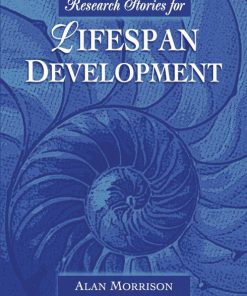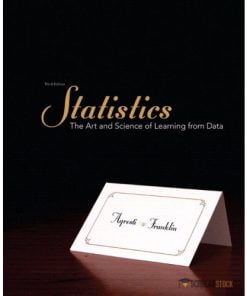Test Bank for Research Stories for Introductory Psychology, 3/E 3rd Edition : 0205520650
$35.00 Original price was: $35.00.$26.50Current price is: $26.50.
Test Bank for Research Stories for Introductory Psychology, 3/E 3rd Edition : 0205520650
Instant download A Descriptive Test Bank for Research Stories for Introductory Psychology, 3/E By Joshua Duntley Lary C Shaffer Matthew R. Merrens pdf docx epub after payment.

Product details:
- ISBN-10 : 0205520650
- ISBN-13 : 978-0205520657
- Author: Duntley
In order to think critically, you need to know that the findings of psychology are tightly laced to the methods. It is with this premise that Research Stories for Introductory Psychology begins. The unique collection of readings retells stories of key research that explain the very foundation of the discipline. Chapters are organized to correspond with those of nearly every introductory text, making it a strong supplemental text. Research Stories for Introductory Psychology can also be used in place of a more traditional book or in conjunction with additional paperback books.
Table Of Contents:
PART I — PSYCHOLOGICAL SCIENCE AND METHODS
Chapter 1 — Oh Rats!
Incorporating the research of Kim, Kalynchuk,, Kornecook, Mumby, Dadgar, Pinel, and Weinberg, “Object-Recognition and Spatial Learning and Memory in Rats Prenatally Exposed to Ethanol”
Chapter 2 — Psychics and Scientists
Incorporating the research of Wiseman, West, and Stemman, An Experimental Test of Psychic Detection”
Chapter 3 — You’re Driving Me Crazy
Incorporating the research of Deffenbacher, Lynch, Oetting, and Yingling, “Driving Anger: Correlates and Test of State-Trait Theory”
PART II — BIOPSYCHOLOGY
Chapter 4 — Zipping Up the Genes
Incorporating the research of Bouchard and McGue, “Genetic and Rearing Environmental Influences on Adult Personality: An analysis of Adopted Twins Reared Apart”
Chapter 5 — The Nose Knows
Incorporating the research of Thornhill and Gangestad, “The Scent of Symmetry: A Human Sex Pheromone that Signals Fitness?”
PART III — LEARNING
Chapter 6 — Being Sick of the Hospital
Incorporating the research of Bovbjerg, Redd, Maier, Holland, Lesko, Niedzwiecki, Rubin, and Hakes, “Anticipatory Immune Suppression and Nausea in Women Receiving Cyclic Chemotherapy for Ovarian Cancer”
Chapter 7 — Yoking Smoking
Incorporating the research of Roll, Higgins, and Badger, “An Experimental Comparison of Three Different Schedules of Reinforcement of Drug Abstinence Using Cigarette Smoking as an Exemplar”
Chapter 8 — I Do!
Incorporating the research of Dowrick and Raeburn, “Self-Modeling: Rapid Skill Training for Children with Physical Disabilities”
PART IV — DEVELOPMENT
Chapter 9 — The Wolf in Sheepdog’s Clothing
Incorporating previously unpublished observations of Shaffer and Tinbergen. Adapted from research presented in Shaffer, “Man Bites Dog”
Chapter 10 — Now You See It, Now You Don’t
Incorporating the research of: Luo, Baillargeon, Brueckner, and Munakata, “Reasoning about a Hidden Object after a Delay: Evidence for Robust Representations in 5-month-old Infants”
Chapter 11 — Adolescents Will Be Adolescents
Incorporating the research of Wainright and Patterson, “Delinquency, Victimization, and Substance Use among Adolescents with Female Same-sex Parents”
PART V — COGNITIVE
Chapter 12 — Kids Say the Darndest Things
Incorporating the research of Leichtman and Ceci, “The Effects of Stereotypes and Suggestions on Preschoolers’ Reports”
Chapter 13 — Flash in the Pan
Incorporating the research of Lee & Brown, “Delay Related Changes in Personal Memories for September 11, 2001”
Chapter 14 — They Don’t Look the Same to Me
Incorporating the research of Ackerman, Shapiro, Neuberg, Kenrick, Becker, Griskevicius, Maner, and Shchaller, “They All Look the Same to Me (Unless They’re Angry): From Out-group Homogeneity to Out-group Heterogeneity”
PART VI — EMOTION
Chapter 15 — Mad about You
Incorporating the research of Buss, Larsen, Westen, and Semmelroth, “Sex Differences in Jealousy: Evolution, Physiology, and Psychology”
Chapter 16 — Pants on Fire
Incorporating the research of Frank and Ekman, “The Ability to Detect Deceit Generalizes across Different Types of High-Stake Lies”
Chapter 17 — Aggression Breeds Aggression
Incorporating the research of Bushman, Baumeister, and Stack, “Catharsis, Aggression, and Persuasive Influences: Self-Fulfilling or Self-Defeating Prophecies?”
PART VII — PERSONALITY
Chapter 18 — Some Like it Hot
Incoporating the research of Kirkpatrick, Waugh, Valencia, and Webster, “The Functional Domain Specificity of Self-Esteem and the Differential Prediction of Aggression”
Chapter 19 — Going to Pot
Incoroporating the research of Shedler and Block, “Adolescent Drug Use and Psychological Health: A Longitudinal Inquiry”
PART VIII — STRESS AND HEALTH (Health Psychology)
Chapter 20 — To Catch a Cold (1993)
Incorporating the research of Cohen, Tyrell, and Smith, “Negative Life Events, Perceived Stress, Negative Affect, and Susceptibility to the Common Cold”
Chapter 21 — Spaced Out (1980)
Incorporating the research of Baum and Davis, “Reducing the Stress of High-Density Living: An Architectural Intervention”
Chapter 22 — Weight Loss that Works (1999)
Incorporating the research of Sbrocco, Nedegaard, Stone, and Lewis, “Behavioral Choice Treatment Promotes Continuing Weight Loss: Preliminary Results of a Cognitive-Behavioral Decision-Based Treatment for Obesity”
PART IX — BEHAVIOR CHANGE
Chapter 23 — I Think I Can, I Think I Can (1994)
Incorporating the research of Martocchio, “Effects of Conceptions of Ability on Anxiety, Self-Efficacy, and Learning in Training”
Chapter 24 — Betting on the Winners (1997)
Incorporating the research of Sylvain, Ladouceur, and Boisvert, “Cognitive and Behavioral Treatment of Pathological Gambling: A Controlled Study”
Chapter 25 — Behavioral Treatment to Change Vocalization Patterns in a Person with Schizophrenia
Incorporating the research of Wilder, Masuda, O’Connor, and Baham, “Brief Functional Analysis and Treatment of Bizarre Vocalizations in an Adult with Schizophrenia”
Chapter 26 — Tokens Against Aggression
LePage, DelBen, Pollard, McGhee, VanHorn, Murphy, Lewis, Aboraya, and Mogge, “Reducing Assaults on an Acute Psychiatric Unit Using a Token Economy: A 2-year Follow-Up”
PART X — SOCIAL
Chapter 27 — I Confess (1996)
Incorporating the research of Kassin and Kiechel, “The Social Psychology of False Confessions: Compliance, Internalization, and Confabulation”
Chapter 28 — I’m OK, You’re Not (1997)
Incorporating the research of Fein and Spencer, “Prejudice as Self-Image Maintenance: Affirming the Self through Derogating Others”
Chapter 29 — It’s in the Bag (1994)
Incorporating the research of Stone, Aronson, Crain, Winslow, and Fried, “Inducing Hypocrisy as a means of Encouraging Young Adults to Use Condoms”
PART XI — APPLIED
Chapter 30 — Who’s Afraid of the Big Bad Ad? (1996)
Incorporating the research of La Tour, Snipes, And Bliss, “Don’t Be Afraid to Use Fear Appeals: An Experimental Study”
Chapter 31 — I’m Warning You (1989)
Incoporating the research of Wogalter, Allison, and McKenna, “Effects of Cost and Social Influence on Warning Compliance”
Chapter 32 — Does TV Violence Sell? (1998)
Incorporating the research of Bushman, “Effects of Television Violence on Memory for Commercial Messages”
People also search:
|
how to write an introduction for a psychology research paper
|
introductory psychology topics
|
intro to psychology research paper topics
|
|
good research topics for psychology students
|
|
introduction to psychology for high school students
|
You may also like…
Test Bank
Test Bank for Forensic Psychology 3/E 3rd Edition Joanna Pozzulo, Craig Bennell, Adelle Forth













